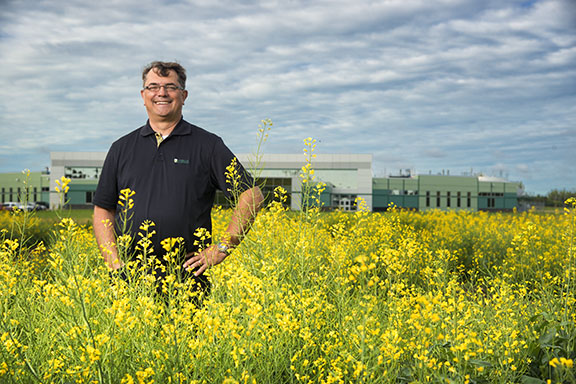Canada has opportunity to lead the world in innovative agri-food technologies and exports
 By Stan Blade
By Stan Blade
Dr. Stan Blade, PhD, PAg, is Dean of the Faculty of Agricultural, Life & Environmental Sciences at the University of Alberta.
If your mental image of agriculture includes a photogenic red barn and a person holding a pitchfork, you should know that things have changed.
Alberta is an agri-food powerhouse with a history of innovation, a significant player in the $8-trillion global food system. The province’s agri-food sector has a total estimated annual value of $56 billion and employs 275,000 people in primary production, food processing, grocery retail, and food and beverage services.
Alberta’s success is mirrored across Canada. When Dominic Barton chaired the Canadian Minister of Finance’s Advisory Committee on Economic Growth with a mandate to identify “bold ideas that will significantly improve Canada’s economic growth trajectory,” the agriculture and food sector was identified in the first Barton Report in 2017. The report stated Canada can become “the trusted global leader in safe, nutritious, and sustainable food for the 21st century.”
How is the sector doing? The Barton Report set a stretch target to increase agri-food exports from $55 billion in 2017 to $75 billion in 2025. Last year Canada exported more than $82 billion of products, according to the Standing Committee on Agriculture and Agri-Food.
But this sector faces multiple challenges, some of them global. Even though we have the resources right here in Canada to address these challenges, the solutions must be driven by public and private investment.
Multiple reports have indicated we need to:
- invest in training the people needed to enable the success of our sector through increased funding of post-secondaries;
- place more emphasis on adding value to our agricultural products;
- develop new markets and address significant trade barriers;
- invest in the development and adoption of new technologies to increase competitiveness and profitability; and
- address Canadian regulatory, infrastructure and digital limitations.
This entire effort should be incorporated into a Canadian strategy embraced by industry, federal and provincial governments, and post-secondary institutions.
With concerted effort, collaboration and investment, I believe Canada can reach $100 billion in agri-food exports by 2030 (while ensuring long-term sustainability), with Alberta having the capacity to double its agri-food exports to $25 billion.
But achieving such a target will require investing in research and innovation. It will require a clear understanding of what’s at stake and a strong commitment — from our many communities, the private sector, research institutions and governments — to build the sector.
Clear targets needed for agri-food sector
Last September, I welcomed first-year students to the Faculty of Agricultural, Life & Environmental Sciences (ALES) at the University of Alberta. I reminded them that they will be engaged with some of the world’s most pressing challenges. These include: managing our natural resources in a sustainable manner; addressing the impact of climate change on food, forestry and energy sectors; and improving productivity to feed the world’s population.
Our students will graduate with the mindset, education and skills needed to take on these global challenges and move us into the future. However, Alberta’s (and Canada’s) agri-food sector needs to come together to set clear targets for what that future will look like.
Researchers in the ALES faculty work across the spectrum of agriculture, food, nutrition and human health to support the sustainability of communities, economies and the globe. Their work leads to innovations that contribute to the profitability and competitiveness of the sector.
Our researchers are using the latest tools in genomics to enhance the yield and quality of crops, increase feed efficiency in cattle and control greenhouse gases. Our 25,000 acres of research farms and ranches are helping explore how to manage carbon by locking it into our soils.
Food scientists are working to improve food safety and teaming up with industry to create new plant protein products for a burgeoning market.
Our researchers are collaborating with Indigenous communities to establish food sovereignty by developing community-led systems to produce, distribute and consume food.
We also believe the faculty has the opportunity — and responsibility — to provide evidence-based information to the public, governments and our partners in industry about the complex issues facing the sector. To that end, we have hosted forums on animal welfare, transgenic technologies, lab-grown meat, and the implications of multinational agri-food company consolidation.
Canada has all the elements required to be a world leader
There are hopeful signs that the opportunity is being recognized. In 2021, $11.3 billion was invested in global agri-tech, according to Investment Monitor.
The ALES faculty’s recent partnership with SVG Thrive, an agri-food innovation incubator, is an example of how agriculture and food technology has captured the attention of venture capital markets.
The potential impact of these investments can be summed up in one sentence from my personal hero, Dr. Norman Borlaug, PhD, the only agricultural scientist to be awarded the Nobel Peace Prize in 1970 for his contributions to what came to be known as the “Green Revolution.” His innovative research and humanitarian advocacy are said to have “saved more lives than any person who has ever lived,” as the World Food Prize Foundation phrased it.
In the 1990s, I had the pleasure of speaking with Dr. Borlaug and he paraphrased a quote for which he is famous: “The first essential component is adequate food for all.”
This is our time. Canada has all the elements — remarkable people, extensive natural resources, strong R&D capacity, crucial infrastructure, access to capital and inputs — to lead the world in implementing the next generation of innovation to create food-secure, economically vibrant and environmentally sustainable global communities.
R$
| Organizations: | |
| People: | |
| Topics: |
Events For Leaders in
Science, Tech, Innovation, and Policy
Discuss and learn from those in the know at our virtual and in-person events.
See Upcoming Events
You have 0 free articles remaining.
Don't miss out - start your free trial today.
Start your FREE trial Already a member? Log in
By using this website, you agree to our use of cookies. We use cookies to provide you with a great experience and to help our website run effectively in accordance with our Privacy Policy and Terms of Service.





